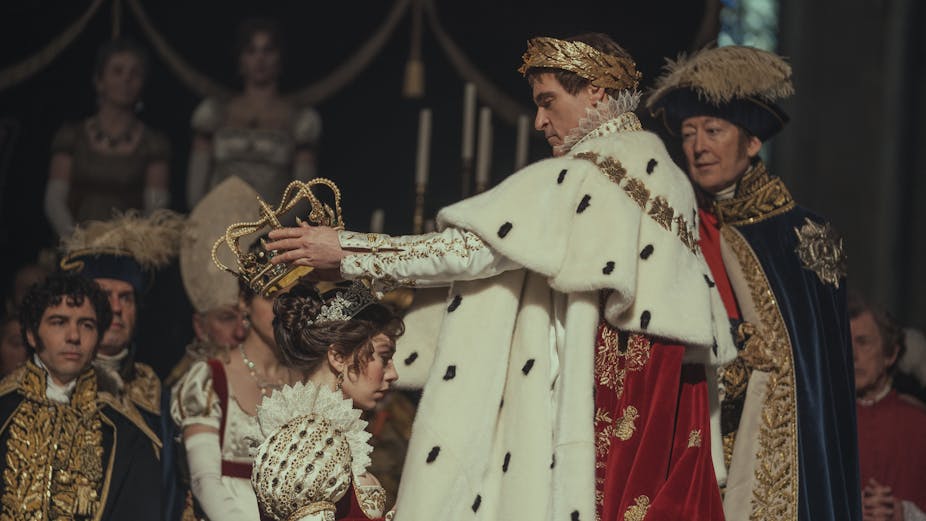This article was first published in our email newsletter Something Good, which every fortnight brings you a summary of the best things to watch, visit and read, as recommended and analysed by academic experts. Click here to receive the newsletter direct to your inbox.
I went to see Ridley Scott’s Napoleon biopic last night. I’d been primed by the early reviews to expect something on an epic scale, sweeping his fearsome military career, formidable years as emperor of France and lonely final days in exile. What I didn’t expect was to get the giggles.
David Scarpa’s screenplay is devilishly funny. And whip-smart too. His Napoleon whines with sexual frustration, stamps his feet when he doesn’t get his way and insists – with a straight face – that the very lamb chops he dines on were destined for his plate.
Enjoyable as it was, I was thankful that I’d had the benefit of our experts’ insights before heading to the cinema. It meant I could sit back and be entertained, knowing that Napoleon never really shot at the pyramids, or tricked his enemy into battling on ice. The scenes worked as stand-ins for the general’s decades at war.
And I was all-the-more invested in the love story (if you could call it that) with Josephine for knowing the true story of their courtship and marriage. Napoleon wrote to his wife religiously, telling her how jealous he was, how he’d die without her affection – and nearly always signing off with “a thousand kisses”. For her part, Josephine often didn’t open his letters at all. Her complicated relationship with Napoleon – and with power – is the most interesting thing about the film.
Read more: Napoleon and Josephine’s real relationship was intense – but they loved power more than each other
Marking milestones
Another famous leader is being remembered this week. Wednesday marked the 60th anniversary of the assassination of US president John F. Kennedy. To mark the milestone, we asked seven experts in US history, his presidency and conspiracy theories around his death to recommend a piece of art or culture that sheds light on the event and its consequences.
Some, as you may expect, chose the ways JFK has been depicted in films and literature. There’s the Kevin Costner classic JFK from 1991, or Stephen King’s time travel novel 11/22/63, which is as enjoyable as it is long. But there are also surprising choices, including a series of works by pop artist Andy Warhol.

On the theme of anniversaries, a science fiction classic turned 50 this week. The original Westworld film, released way before HBO’s spinoff show became a runaway success, broke new cinematic ground for the genre. Not least paving the way for the kind of self-referential cinema that would be taken up in the 21st century by studios such as Marvel.
The film centres on a theme park where visitors can enter a simulated fantasy world – Pompeii, medieval Europe, or the old west. Once there, they can live out their wildest fantasies. They can even have sex with the synthetic playthings that populate the worlds. Of course, it all goes terribly wrong. Our expert discusses the many ways the film was ahead of its time, and that unforgettable performance from Yul Brynner as a gun-slinging android hell bent on revenge.
Read more: Westworld at 50: Michael Crichton's AI dystopia was ahead of its time
I plan to rewatch Westworld this weekend in conjunction with a new sci-fi masterpiece – Netflix’s anime miniseries, Pluto. To our expert’s mind, it’s the best thing Netflix has released all year. The series explores a vision of the future wherein robots and humans live side-by-side. The implications – and dangers – of casting AI in subservient roles becomes all too clear when the lead character (himself a robot) begins investigating a string of high profile murders.
Read more: Pluto: Netflix's anime masterpiece explores how robots 'feel' when humans exploit them
Reading the Booker
Sunday is set to be a big night in the publishing world, as the winner of the 2023 Booker prize is announced. From a longlist of 12, six books are in the running for the final prize, and we’ve lined up experts to review each one.
From tales of a young girl fiercely playing squash to cope with the grief of her mother’s death, to a vision of Ireland under an authoritarian state, the nominees are wildly distinct and make for an especially hard-to-call race.
Read more: Booker prize 2023: the six shortlisted books reviewed by our experts
If I had to choose, my money would be on Irish writer Paul Murray for The Bee Sting. The dysfunctional family tale paints a portrait of contemporary Ireland that is both wickedly funny and deeply tragic.
It’s his fourth novel, but first Booker nomination – and he’s not the only Irish author in the running. Paul Lynch is also nominated for his novel, Prophet Song. We asked an expert in Irish literature to explain what the Irish nominees’ work has to say about contemporary Ireland.
Read more: Paul Lynch wins Booker prize 2023: why we're in a 'golden age' of Irish writing

Looking for something good? Cut through the noise with a carefully curated selection of the latest releases, live events and exhibitions, straight to your inbox every fortnight, on Fridays. Sign up here.

